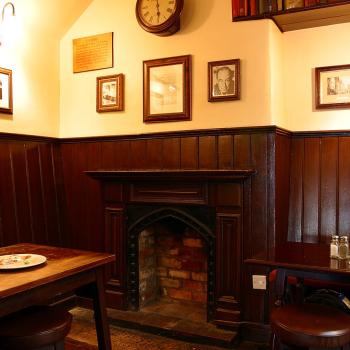It was after the bloody and terrible battle of Iwo Jima, in which more than 50,000 Americans lost their lives, that Rabbi Roland Gittlesohn, the first Jewish chaplain to serve with the Marine Corps, was asked by the Protestant chaplain of the 5th Marine Division to give the sermon for a combined (all-faiths) memorial service to dedicate the Marine cemetery. Rabbi Gittlesohn had served throughout the battle with courage and distinction, ministering tirelessly to the fallen of all faiths.
Many of the Christian chaplains objected to this plan. The 5th Division chaplain stood by his decision, but Rabbi Gittlesohn, hoping to spare him further conflict and embarrassment, withdrew from the all-faiths service. Ultimately, three separate services were held. Some of the Protestant chaplains were incensed at this outcome, however, and chose to attend Gittlesohn's service instead of their own. One of them, impressed with the words the rabbi spoke, circulated copies of the address to his regiment.
Through the Marines' letters home, Rabbi Gittlesohn's sermon made its way to Time magazine, into the Congressional Record, and into thousands of Memorial Day addresses across America in the years since World War II:
Here lie men who loved America because their ancestors generations ago helped in her founding. And other men who loved her with equal passion because they themselves or their own fathers escaped from oppression to her blessed shores. Here lie officers and men, Negroes and Whites, rich men and poor, together. Here are Protestants, Catholics, and Jews together . . . Among these men there is no discrimination. No prejudices. No hatred. Theirs is the highest and purest democracy . . .
Whosoever of us lifts his hand in hate against a brother, or who thinks himself superior to those who happen to be in the minority, makes of this ceremony and the bloody sacrifice it commemorates, an empty, hollow mockery. To this then, as our solemn sacred duty, do we the living now dedicate ourselves: To the right of Protestants, Catholics, and Jews, of White men and Negroes alike, to enjoy the democracy for which all of them have here paid the price . . .
We here solemnly swear this shall not be in vain. Out of this and from the suffering and sorrow of those who mourn this, will come, we promise, the birth of a new freedom for the sons of men everywhere.
Nearly forty years later, another Jewish chaplain—this time a Navy chaplain with the U.S. Sixth Fleet in the Mediterranean—memorably evoked the significance of religious liberty and tolerance to America's national character. In a 1984 address, Ronald Reagan quoted the words of Rabbi Lieutenant Commander Arnold Resnicoff, who was one of the first on scene after the terrorist bombing of the Marine Corps barracks in Lebanon in 1983:
I remember the first time I jumped in a foxhole, the first time the shells actually fell within the U.S. area. Looking around at the others in there with me, I made the remark that we probably had the only interfaith foxholes in Beirut. The Druze, the Muslims, Christians, all had theirs. The Jewish forces in the Israeli Army had theirs. But we were together. I made the comment then that perhaps if the world had more interfaith foxholes, there might be less of a need for foxholes altogether.
Military chaplains, men and women of God, are spiritual leaders and practical servants. But they are also standard-bearers, living banners, the embodiment of what America is about and what her fighting men and women sacrifice for.
Writing about Chaplain Dale Goetz's death, the Colorado Springs Gazette made this observation:
For the first time since the Vietnam War, the military had to adjust its memorial service when it was time to pay last respects to Dale Goetz. Soldiers killed in battle are honored by placing their helmets, dog tags and boots next to their rifles, but chaplains are unarmed.
For chaplain Goetz, a wooden cross took the place of the weapon.
Unarmed? Perhaps. But perhaps the chaplains of the U.S. military—both those who have returned and those on "eternal deployment"—have borne America's mightiest arms of all.
In memoriam. Pro Deo et Patria.





